 |
International Affairs
The New Kremlin Bridgehead
in Latin America
André F. Garcia, Brazil
Some readers have asked me for more data regarding an article I posted here about the Russian presence in Latin America. I offer them the following historic-political picture.
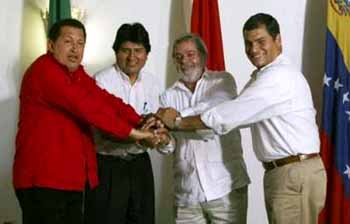
At a meeting in Manaus in September 2008, from the left, Communist presidents Chavez (Venezuela), Morales (Bolivia), Lula (Brazil), and Correa (Ecuador) challenge US influence
|
As I already reported, Russia recently asked for admission as an observer in the Defense Council of Unasul (the Union of South American Nations) during a meeting in Buenos Aires. It appears that the request will be accepted, which will worsen the situation in the Southern Hemisphere.
The Russian delegation also asked for admission into the Latin American Center for Peace Operations (Alcopaz). Defense experts from Russia and Argentina also took part in the first meeting of a joint commission on military and technical cooperation on November 17-18, at which Russia agreed to sell heavy helicopters to that South American nation.
Granting Russians admission to these South American organs as well as the purchase of more Russian war equipment are extremely grave matters that should raise concern everywhere. To justify this affirmation I offer these data.
UNASUL, a new tool to push forward a continental revolution
Unasul is a supranational and intergovernmental group created in May 2008 in Brasilia as part of a continuing process to integrate South America politics, economics and military affairs. It includes 12 members: Argentina, Bolívia, Brazil, Chile, Colombia, Ecuador, Guiana, Paraguay, Peru, Suriname, Uruguay and Venezuela. Mexico and Panama attend its meetings as observers.
One of its economic aims is to establish a free trade zone throughout the continent, thus replacing two existing free-trade organizations – Mercosur and the Andean Community. As far as ideology is concerned, most of the member countries are against the United States and the FTAA (Free Trade Area of the Americas), an agreement proposed by the United States to unite the Americas into a single free trade area with the exclusion of Cuba). With this, we see a socialist and anti-U.S. bloc being established in South America
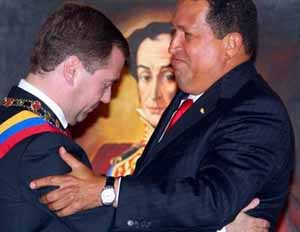
Chavez decorates Russian President Medvedev with the Liberator Order (November 28, 2008) |
The seat of this organization is in Quito, Ecuador; its bank in Caracas, Venezuela; its parliament, in Cochabamba, Bolívia. It is precisely these countries whose leaders - Rafael Correa, Hugo Chávez and Evo Morales - are considered driving forces for a continental Communist Revolution – along with Cuba, of course.
The rotating-presidency of Unasul is presently held by Michelle Bachelet, the socialist Chilean president. At its September summit in Santiago, the nine presidents gathered there declared their unanimous support for Evo Morales in his internal political conflict against four Bolivian States that are demanding greater autonomy from the Morales government. So, Unasul’s first political act was to fortify the Marxist Morales against his opponents. This would follow the lines of the Forum of São Paulo, an even more ideologically leftist organization founded in 1990 by Fidel Castro and Lula (Brazil) to revive Communism. (1)
In the military field, the first practical act of Unasul’s Defense Council was to welcome the Russian presence in South America to the detriment of the North American influence. These first acts indicate the pro-Communist and pro-Socialist aims of the new organization.
The Russian bridgehead in Venezuela
The military relationship between Venezuela and Russia is a consummate fact. Hugo Chaves has already spent $ 4 billion for 24 Sukhoi jets, 50 helicopters and 100,000 Russian rifles. His next purchase includes 10-20 Tor-M1 anti-aircraft systems, new missiles and between 100-500 tanks and submarines.
During his recent visit to Russia, Chavez pledged a strategic alliance to defend his country against the supposed threat of the United States. On that occasion, Russian president Dmitri Medvedev told Chavez that cooperation between Moscow and Caracas would become “one of the fundamental factors of security for Latin America.” (2)
Russia’s attempted alliance during the Falklands War
Today Russia is tightening its political-military relations with Argentina, again, with aims of increasing its presence in South America. The Russian policy that has developed over the last few years justifies growing fears that we are seeing the consolidation of a collectivist, totalitarian and imperialist power that has extended its grip into the Americas.
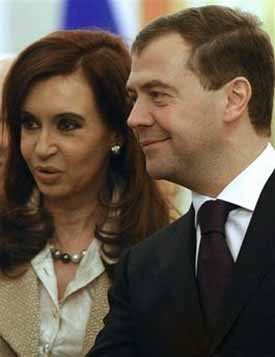
Argentine President Cristina Kirchner agreed to a strategic partnership with Medvedev in Moscow (December 9, 2008)
|
In 1982 Russia attempted an alliance with the Argentine military government to participate in the war against England over the Falkland Islands.
Secret reports now known confirm this Russian involvement. It was Russian radar systems and nuclear submarines that allowed the Argentine forces to follow British military movements. Russia also took advantage of the occasion to increase its secret service in Buenos Aires. It was Fidel Castro – obviously with Russia’s approval – who offered Cuban troops to help Argentina against the Britons.
According to a major Brazilian newspaper, “It was with concern that the Brazilian government followed the Soviet assistance given to Argentina in 1982" as it watched Argentina approach Communist countries in the Soviet Empire to receive arms, air bases and enriched uranium. Through Libya – directed by Khadafi – it received 120 Russian Sam-7 missiles. (3)
In fact, the reason the United States did not give its official support to England in the Falkland conflict was to avoid giving the USSR a pretext to expand its military presence in the area. Then-President Ronald Reagan feared this could have led to a world war. This information was recently revealed by 170 secret documents made public by the U.S. State Department at the request of the Argentina daily La Nación. (4)
Russian general Nikolai Sergeievitch Leonov, a past KGB director, confirmed the Russian interest in intervention: “Initially we wanted to give arms straight to the government, but it wanted them through commercial channels. We were ready to go very far in that war, much further than one can imagine. They needed ground-to-air and sea-to-sea missiles but didn’t dare buy Soviet arms. So, we provided satellite images of British ship movement in the Atlantic. But I don’t think they trusted the data we sent, and the contacts broke down." (5)
Communists and South America during the Cold War
During the Cold War, the Communist bloc led by the Soviet Union faced off the Western bloc led by the United States. The fall of the Berlin Wall and apparent change of regime resulted not only from the growing internal discontent in the USSR, but also from the difficult impasse at which the Communist movement found itself. That crossroads was caused by the failure of the classic Communist strategies: violent subversive action, pretended democratic elections, programs to increase ideological fervor.
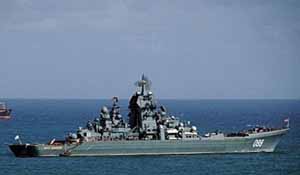
Russian missile cruiser Pyotr Veliky stayed in Venezuela waters during the Russian President's visit |
The solution for this situation was an intensification of a psychological warfare, which applied the so-called Gramsci doctrine. The goal of this psy war was to destroy the will to fight in the adversary by spreading a propaganda that discouraged, neutralized, and demoralized those who took a militant position in the West.
The Gramsci strategy was aimed not just at the political powers, but at the whole society. To achieve this social-cultural dominion and change the very mentalities of the people, it was necessary to neutralize the greatest bulwark of the anti-Communist fight, the Catholic Church, and transform her into the leader of the revolutionary ideals. During the 20th century the Western nations and the Catholic Church were victims of this strategy.
At the same time, South America became an opportune target for the international Communist movement. In the 1970s the rise of Marxist Salvador Allende to the Chilean presidency – with the help of the Christian Democrats and the Cardinal Silva Henriquez of Santiago – reignited Communist hopes. The fall of Allende, however, and the installation of an anti-Communist military dictatorship in South America represented a step backward in its plan.
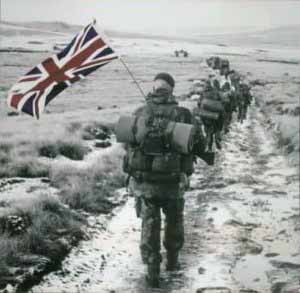
British troops in the Falklands war |
In the 1980s the Falklands War, as I have already observed, opened a door for the Russian Communists to install their bases in Argentina. Local patriotism was heated at the initial invasion, undertaken with the aim of recovering those Islands lost to England a century earlier. Britain launched a naval task force to engage the Argentine Navy and Air Force and retake the islands by amphibious assault. At a certain moment, however, Argentine enthusiasm for the venture dwindled, and the war ended with a British victory. Exposing the Communist involvement in that war played an important role in the change of scenario.
A manifesto alerting Catholic public opinion in Argentina of this Communist association was published by the then courageous and strong TFPs in newspapers of many world capitals, including Buenos Aires and London. It asked these crucial questions:
“If we dare to face England for the love of the Falklands, why don’t we dare to refuse an alliance with Communist Russia for the love of God?”
“If Argentina allies itself with Russia or accepts Russian military support, we will lose much more than we will gain, since the obvious intention of Russia is - sooner or later - to dominate our homeland.” [6]
These publications, followed by lively street campaigns to enlighten public opinion in various countries, had a decisive effect on the war. This was recognized by General Leonov himself who stated in an interview: "During the war the British spotted Soviet ships and submarines near the waters of conflict. This insinuation of Soviet support was all that was needed … for Argentine groups - such as Tradition, Family and Property - to go to the streets to criticize the until-then popular government and war.” [7]
Here I cannot fail to emphasize the courageous action of Plinio Corrêa de Oliveira, who advised the Argentine TFP, published an open letter to Brazilian authorities on the topic, and promoted the international public campaign of support for the action of the Argentine TFP.
Russian hopes reborn in today’s South-America
Those street campaigns of the past were recalled to underscore the dramatic situation in which we find ourselves now facing the growing danger represented by the new Russian policy. Today there is the notorious absence of any organized anti-Communist movements capable of galvanizing public opinion in street campaigns. A state of general apathy reigns in the public.
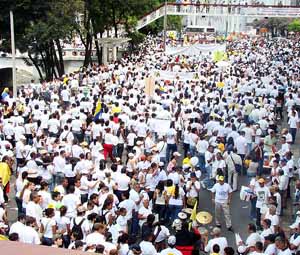
Colombians take to the streets en masse to protest the FARC guerilla violence |
One exception to this general rule can be noted: at the beginning of 2008, millions of people in Colombia spontaneously went to the streets to protest against the FARC, a revolutionary guerilla movement. But in indolent Argentina, no sign remains of the anti-Communist reaction that came to fore in the epoch of the Falklands War. In the case of popular demonstrations of organizations demanding greater autonomy in Bolivia or the protesters rallying against President Néstor Kirchner of Argentina, one has the impression that any sound reaction is damaged by the inept tactics employed, which confront chaos with the same arms of chaos instead of order.
In the 25 years that have passed since the Falklands War, we see that the revolutionary psychological warfare and application of the Gramsci strategy have not ceased. And the collapse of the psychological resistance of the people to Communism and Socialism has intensified.
After the breakdown of the Soviet Empire at the beginning of the 1990s that gave the impression of the dismantling of Communism, the celebrated Forum of São Paulo was formed in Latin America. Its aim was to recuperate on this continent what had been lost in Eastern Europe. In less than 20 years, its members managed to bring to power Communist/Socialist leaders in more than a dozen South American nations. The recent creation of Unasul, to the degree that it serves the designs of the Forum, represents a unpredecented Red danger for the Continent.
The new bridgeheads of the Kremlin in Latin America foresee a troubling future that raises serious questions. Certainly the Russian presence will help to suppress any healthy anti-Communist and anti-Socialist reactions. Will nationalist concerns be re-ignited with the new political-military alliance between Russia and Argentina? Is a new focus of international conflict being prepared in Argentina, transforming into reality the threats of Hugo Chavez to make “other South American Vietnams”?
The change of South America into a theater of operations for the North-American, English and Russian military forces is a distressing hypothesis that would have tragic consequences for our continent and the world.
1. About the Forum of São Paulo, see the letter of Alejandro Peña Esclusa: ; See also Forum of São Paulo (FSP): Leftist Summit in Montevideo
2. EFE Dispatch, Moscow, July 22, 2008.
3. O Estado de São Paulo, November 12, 2006.
4. See El Mercurio, Santiago do Chile, April 2, 2002.
5. Igor Gielow, "Russo fala sobre como financiou comunistas na América do Sul," Folha de Sao Paulo Online, January 13, 2008
6. Manifesto of the Argentine TFP, "La independencia de la Argentina católica ante la efectividad de la soberania en un territorio insular," published originally in La Nación on April 13, 1982, and later in Clarín (Buenos Aires). It was also published in newspapers in Washington, New York, London, São Paulo, Caracas, Bogotá and Cartagena (Colombia), Quito and Guayaquil (Ecuador), and Santiago (Chile), as well as organs in Spain. It was re-published by the BBC de London.
7. "Russo fala sobre como financiou comunistas," Folha Online, January 13, 2008

Posted December 22, 2008

Related Topics of Interest
 The Growing Russian Military Presence in Latin America The Growing Russian Military Presence in Latin America
 Moscow’s New Onslaught Moscow’s New Onslaught
 A Socialist West? When? A Socialist West? When?
 Forum of São Paulo: Leftist Summit in Montevideo Forum of São Paulo: Leftist Summit in Montevideo
 The Web of Terror The Web of Terror
 Moscow Declares Change in the Global Balance of Power Moscow Declares Change in the Global Balance of Power
 Latin America Is Becoming Communist Latin America Is Becoming Communist
 Fidel's Real Successor Fidel's Real Successor

Related Works of Interest
|
|
International Affairs | Hot Topics | Home | Books | CDs | Search | Contact Us | Donate

© 2002- Tradition in Action, Inc. All Rights
Reserved
|
 |
|